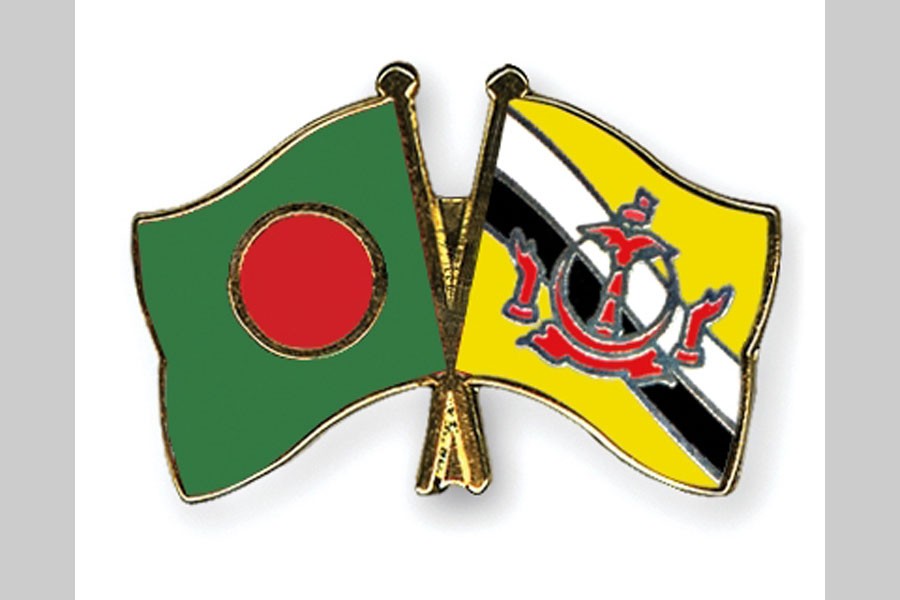
Published :
Updated :

At the invitation of Brunei's Sultan Haji Hassanal Bolkiah Mu'izzaddin Waddaulah, Prime Minister Sheikh Hasina along with eight of her cabinet ministers and a delegation of business leaders, officially visited Brunei Darussalam from April 21-23, 2019.
Hasina used her visit with the explicit goal of exploring new opportunities and promoting economic partnership between Brunei and Bangladesh. Notably, her visit coincided with the 35th anniversary of the founding of diplomatic relations between the two countries.
With an estimated population of 439,338 and gross domestic product (GDP) of US$15.4 billion, Brunei is one of the smallest states in Asia. It's GDP per capita income is about US$31,501.50.
In view of common membership of the United Nations (UN), Organisation of Islamic Cooperation (OIC), and the Commonwealth, Brunei and Bangladesh share similar outlooks on many regional and international issues.
Still, it has taken 20 years to organise the first-ever Foreign Office Consultations (FOC) in Dhaka in September 2018. Bangladeshi diplomats have been blamed for not dedicating efforts to build-up and strengthen relations with Brunei during this time.
However, dialogues of the first FOC were productive as both sides stressed regular exchange of visits and interaction to promote bilateral cooperation.
Currently, about 20,000 Bangladeshi expatriates are employed in Brunei. They are working in the petroleum and gas, education, health and construction sectors. The migrant workers are contributing to the economic development of Brunei and also to Bangladesh's economy by remitting foreign currency.
Despite huge potential, bilateral trade is still insignificant. Latest figures show that Bangladesh exported products worth $1.11 million to Brunei and imported products worth $0.51 million in FY 2017-18.
Bangladeshi exports to Brunei included ready-made garments, jute and jute products, leather and leather products, while imports from Brunei include petroleum products and minerals.
On April 22, Bangladesh and Brunei signed six important memorandum of understanding (MoUs) and one exchange of notes. The MoUs inked reflect mutual trust. Both countries should move quickly to properly implement the MoUs in order to strengthen cooperation in the fields of agriculture, fisheries, livestock, culture and sports, and supply of LNG.
The supply of LNG from Brunei is considered important as Bangladesh would need liquefied natural gas (LNG) from Brunei for three reasons. First, the demand for gas is rising rapidly, while domestic gas supply is declining; second, to support speedy economic growth and, third, to lessen dependency on Oman and Qatar for LNG supply.
At the bilateral meeting, the Rohingya issue was also discussed. Sultan Bolkiah emphasised on a just and permanent solution to the crisis. Notably, the Brunei government provided the much needed financial and medical assistance to Rohingya refugees temporarily sheltered in camps in Cox's Bazar.
The joint declaration highlighted that due to growing demand of energy in Bangladesh, both sides have agreed to explore the possibility of inclusive collaboration, especially in the energy sector as well as involvement of both public and private sectors for trade and investments in areas such as petro-chemicals, offshore oil and gas exploration, technical collaboration, and capacity building.
The two countries also agreed to consider a preferential trading agreement and conduct a joint feasibility study for that purpose. But observers think it should be done as early as possible to ensure rapid mutual economic benefits.
While addressing the opening ceremony of Bangladesh-Brunei Business Forum, Hasina urged the Brunei business community to form partnership with entrepreneurs in Bangladesh and invest there. She pointed out that Bangladesh offers one of the most liberal foreign investment regimes in South Asia providing quite a lot of incentives for the investors, including protection of foreign investment, generous tax policy, concessionary duty on import of machinery and full repatriation of dividend and capital.
To promote business relations, a MoU was signed between the Federation of Bangladesh Chambers of Commerce and Industry (FBCCI) and the National Chamber of Commerce and Industry Brunei Darussalam (NCCIBD).
After returning to Bangladesh and while addressing a press conference at her official residence on April 26, Hasina hoped that her visit would further consolidate the friendly relationships between the two countries.
Dr Kamal Uddin Ahmed is a former Professor and Chairman, Department of Political Science, University of Dhaka.


 For all latest news, follow The Financial Express Google News channel.
For all latest news, follow The Financial Express Google News channel.